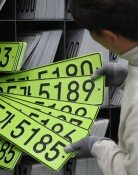Justice Minister Park’s first nominations in prosecution
Justice Minister Park’s first nominations in prosecution
Posted February. 08, 2021 07:30,
Updated February. 08, 2021 07:30
South Korean Justice Minister Park Beom-gye on Sunday announced nominations of chief prosecutors and above for the first time after he took office. Head Attorney Lee Sung-yoon at the Seoul Central District Public Prosecutors' Office remained in office although Prosecutor-General Yoon Seok-yeol requested a new replacement for Lee’s position arguing that he lost authority over inspection control. The justice minister kept intact Lee Joong-geun, criminal department chief of the Supreme Prosecutors' Office. Deputy Minister for Criminal Affairs Shim Jae-cheol only exchanged his place with Lee Jung-su, or Seoul Southern District Prosecutor's Office Attorney. The lineup of prosecutors has not changed at all since they worked for former Justice Minister Choo Mi-ae to get in the way of inspections on the current administration. It is no different than the Justice Ministry under the Choo Season 2.
Taking office last January, former Justice Minister Choo Mi-ae came under controversy every time she pushed forward with personnel nominations without any consultation with Prosecutor-General Yoon. As she might have intended to mitigate controversy over the exclusion of Mr. Yoon in personnel decision-making, Choo had two to three meet-ups with Yoon to discuss personnel affairs. To keep nominations in secret, Choo should have not released photos of her with Mr. Yoon in meet-up settings but she made public release of the photos after the second meeting was held with Yoon. The recent personnel decisions only clarified that the photos were only for show and little discussion was shared mutually to make any difference in personnel affairs.
The Prosecutors' Office Act stipulates a long-standing custom in which the justice minister reflects the opinion of the prosecutor-general into personnel matters. As the two positions are nominated by the president, they do not belong to a single vertical hierarchy. That is why prosecutor personnel is supposed to be discussed prior between the justice minister and the prosecutor-general and the justice minister shall refrain from gaining control of the prosecutor-general’s authority over inspections. Former Minister Choo was at the center of the devastation of prosecution independence by neglecting such procedures and customs. Her successor Park has only started following in her footsteps.
Given that in general personnel reshuffling serves as a system to assess performance and pay compensations to those who deserve recognition, Minister Park has missed fairness in his first personnel appointments. For example, it is Lee Sung-yoon, the head attorney at the Seoul Central District Public Prosecutors' Office, who refused to sign off on a request by inspectors to indict Choi Kang-wook, the leader of the Uri Party, for issuing a false confirmation letter to former Justice Minister Cho Kook’s son and the prosecutor-general managed to make the indictment happen, according to the first verdict on Choi’s guilt. If Head Attorney Lee ignores Prosecutor-General Yoon’s orders only, we may consider that the justice minister might have used Lee to keep Yoon in check. However, Lee betrayed the trust of his subordinates by squashing requests for indictment or otherwise based on their faithful inspections. In that sense, it is not allowable to let him stay in the current position.
Headline News
- N. Korea launches cyberattacks on S. Korea's defense companies
- Major university hospital professors consider a day off each week
- Italy suffers from fiscal deficits from ‘Super Bonus’ scheme
- Inter Milan secures 20th Serie A title, surpassing AC Milan
- Ruling and opposition prioritize spending amid tax revenue shortfalls







